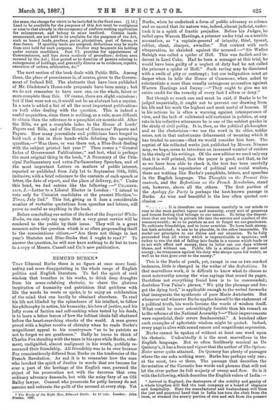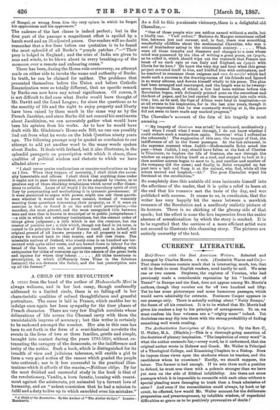EDMUND BURKE.*
THAN Edmund Burke there is no figure at once more fasci- nating and more disappointing in the whole range of English politics and English literature. To feel the spirit of civil wisdom that breathes in his works, to drink deep draughts from his sense-subduing rhetoric, to share the glorious inspiration of humanity and patriotism that quickens with life the words he wrote or spoke, is to enjoy an exhilaration of the mind that can hardly be obtained elsewhere. To read his life not blinded by the splendours of his intellect, to follow his philosophy in action, his humanity, his love of justice, and his lofty scorn of faction and self-seeking when tested by his deeds, is to learn a bitter lesson of how the loftiest ideals fall shattered before the heart-searching shocks of the world. A man grows proud with a higher resolve of chivalry when he reads Burke's magnificent appeal to his countrymen "so to be patriots as not to forget we are gentlemen." Sadly he turns to think of Charles Fox standing with the tears in his eyes while Burke, vehe- ment, undignified, almost malignant in his wrath, publicly re- nounced their friendship. All friendship was to be over because Fox conscientiously differed from Burke on the tendencies of the French Revolution. As sad it is to remember how the man who invoked the spirit of Justice in words that are become for ever a part of the heritage of the English race, pursued the object of his prosecution not with the decorum that even ordinary advocacy demands, but with the noisy fury of an Old Bailey lawyer. Counsel who prosecute for petty larceny do not assume and reiterate the guilt of the accused at every step. Yet • The Works of the Bight Hon. Edmund Burke. In 12 vols. London John Nimmo. 1887. Burke, when he undertook a form of public advocacy so solemn and so sacred that its nature was, indeed, almost judicial, under- took it in a spirit of frantic prejudice. Before his Judges, he railed upon Warren Hastings, a prisoner under trial on a terrible accusation, as " a captain-general of iniquity, thief, tyrant, robber, cheat, sharper, swindler." Not content with such vituperation, he shrieked against the accused :—" Sir Walter Raleigh was called a spider of Hell. This was foolish and in- decent in Lord Coke. Had he been a manager at this trial, he would have been guilty of a neglect of duty had he not called the prisoner a spider of Hell." Such raving may be dismissed with a smile of pity or contempt ; but our indignation must go deeper when he tells the House of Commons, when asked to substantiate a more than usually outrageous accusation against Warren Hastings and Impey :—" They ought to give me an entire credit for the veracity of every fact I affirm or deny."
But though so much can and must be said, if Burke is to be judged impartially, it ought not to prevent our drawing from his life and his work the highest and most useful of lessons. If in his actions he is often a warning against intemperance of view, and the lack of cultivated self-restraint in politics, at any rate in his reflective utterances he is one of the noblest guides in the study of civil polity. It is, then, as the political philosopher and as the rhetorician—we use the word in its older, nobler sense, not in that unfortunate debasement of meaning which it has tended to assume—that we would consider him here. The reprint of his collected works just published by Messrs. Nimmo may, we hope, serve to introduce an increased number of readers to the study of his writings. Of the new edition we need only say that it is well printed, that the paper is good, and that, as far as we have been able to check it, the text has been carefully reproduced. As repositories of political and social wisdom, there are nothing like Burke's pamphlets, letters, and speeches in the English language. The Thoughts on the Present Dis- contents, and the Reflections on the French Revolution, stand out, however, above all the others. The first portion of the Apology for Party is perhaps the best-known passage in Burke. As wise and beautiful is the less often quoted con- clusion :— It is :therefore our business carefully in our minds to rear to the most perfect vigour and maturity, every sort of generous and honest feeling that belongs to our nature. To bring the disposi- tions that are lovely in private life into the service and conduct of the commonwealth ; so to be patriots as not to forget we are gentlemen. To cultivate friendships, and to incur enmities. To have both strong. but both selected ; in one to be placable, in the other immovable. To model our principles to our duties and our situation. To be fully persuaded that all virtue which is impracticable is spurious; and rather to run the risk of falling into faults in a course which leads us to act with effect and energy, than to loiter out our days without blame, and without use. Public life is a situation of power and energy ; he trespasses against his duty who Bleeps upon his watch, as well as he that goes over to the enemy."
This is the Burke of youth, yet, except in one or two marked instances, little is changed in the writer of the Reflections. In that marvellous work, it is difficult to know what to choose as most noteworthy among the wise sayings that crowd its pages. Doubtless not everything found here is to be commended; doubtless Tom Paine's phrase, " We pity the plumage and for- get the dying bird," is applicable enough to the verbal fireworks that inaugurate the apotheosis of poor Marie Antoinette. But whenever and wherever Burke applies himself to the statement of a political truth, his words become the words of wisdom itself. What could be more astonishingly forcible than his remark as to the reforms of the National Assembly ?—"Their improvements were superficial, their errors fundamental" A hundred other such examples of aphoristic wisdom might be quoted. Indeed, every page is alive with sound reason and magnificent expression.
Burke cannot be spoken of without at least one word upon his rhetoric. Undoubtedly it is the most marvellous in the English language. Not so often faultlessly musical as De Quincey's, it has a force and vigour that the author of The Opium- Baler never quite attained. De Quincey has plenty of passages where the ear asks nothing more. Burke has perhaps only one; at the most, two or three. The passage that describes the devastation of the Carnatio has words and phrases that will not let the river gather its full majesty of sweep and flow. So is it with the following, which describes the English rulers of Ladia : — " Arrived in England, the destroyers of the nobility and gentry of a whole kingdom will find the best company at a board of elegance and hospitality. Here the manufacturer and husbandman will bless the just and punctual hand that in India has torn the cloth from the loom, or wrested the scanty portion of rice and salt from the peasant of Bengal, or wrung from him the very opium in which be forgot his oppression:I and his oppressors."
The cadence of the last clause is indeed perfect; but in the first part of the passage a magnificent effect is spoiled by a harsh word and an ill-adjusted pause. Our readers will no doubt remember that a few lines before our quotation is to be found the most splendid of all Burke's "purple patches :"—"Their prey is lodged in England ; and the cries of India are given to seas and winds, to be blown about in every breaking-up of the monsoon over a remote and unhearing.ocean."
There has been, during the Home-rule controversy, an attempt made on either side to invoke the name and authority of Burke. In truth, he can be claimed for neither. The problems that presented themselves before the Union and before Catholic Emancipation were so totally different, that no specific remark by Burke can now have any actual significance. Of course, it is not difficult to feel sure what Burke would have thought of Mr. Davitt and the Land League ; for since the questions as to the sanctity of life and the right to enjoy property and liberty have been raised by them much in the same way as by the French Jacobins, and since Burke did not conceal his sentiments about Jacobinism, we can accurately gather what would have been his opinion from his works. As to how he would have dealt with Mr. Gladstone's Home-rale Bill, no one can possibly find out from what he wrote on the Irish Question ninety years ago. The following passage may be quoted as conclusion to our attempt to add yet another word to the many words spoken about Burke. It deals with Ireland, but it also illustrates, in the splendid panegyric on prescription with which it closes, those qualities of political wisdom and rhetoric to which we have alluded above :— " I shall never praise confiscation. or counter-confiscations as long as I live. When they happen of necessity, I shall think the neces- sity lamentable and odious. I shall think that anything done under it ought not to pass into preoedent, or to be adopted by choice, or to produce any of those shocking retaliation& which never suffer diesen- SiOne to subside. Least of all would I fix the transitory spirit of civil fury by perpetuating and methodising it in tyrannic government. If it were permitted to argue with power, might one ask these-gentle- men whether it would not be more natural, instead of wantonly mooting these questions concerning their property, as if it were an exercise in law, to found it on the solid rock prescription,—the soundest, the most general, and the most recognised title between man and man that is known in municipal or in public jurisprudence ? —a title in which not arbitrary institutions, but the eternal order of things gives judgment; a title which is not the creature, but the master of positive law ; a title which, though not fixed in its term, is rooted in its principle in the law of Nature itself, and is, indeed, the original ground of all known property ; for all property in soil will always be traced back to that source, and will rest there. The miserable natives of Ireland, who ninety-nine in an hundred are tor- mented with quite other cares, and are bowed down to labour for the bread of the hoar, are not, as gentlemen pretend, plodding with antiquaries for titles of centuries ago to the estates of the great lords and squires for whom they labour All titles terminate in prescription, in which (differently from Time in the fabulous instance) the son devours the father, and the last prescription eats op all the former."















































 Previous page
Previous page